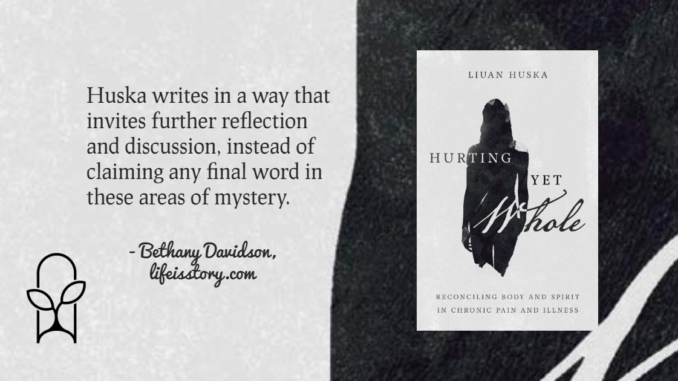
Published by IVP on December 8, 2020
Genres: Non-Fiction, Christian, Theology
Buy on Amazon
Goodreads

What if the things we most fear about our bodies--our vulnerability to illness and pain--are exactly the places where God meets us most fully? As Liuan Huska went through years of chronic pain, she wondered why God seemed absent and questioned some of the common assumptions about healing. What do we do when our bodies don't work the way they should? What is healing, when one has a chronic illness? Can we still be whole when our bodies suffer? The Christian story speaks to our experiences of pain and illness. In the embodiment of Jesus' life, we see an embrace of the body and all of the discomfort and sufferings of being human. Countering a Gnosticism that pits body against spirit, Huska takes us on a journey of exploring how healing is not an escape from the limits of the body, but becoming whole as souls in bodies and bodies with souls. As chronic pain forces us to pay attention to our bodies' vulnerability, we come to embrace the fullness of our broken yet beautiful bodies. She helps us redefine what it means to find healing and wholeness even in the midst of ongoing pain.
In Hurting Yet Whole, Liuan Huska shares about her personal experiences with chronic illness, what she has learned from the struggle, and how her bodily pain has clarified her faith and theology. She seamlessly combines memoir, theology, and social reflection, and encourages her readers to think deeply about how Western views of success devalue the body and hurt people who cannot perform up to society’s expected standards. As she writes about “the cult of normalcy,” she encourages her readers to accept vulnerability in themselves and others, instead of tying their identities to abilities that can swiftly change. Huska explores a theology of the body that makes room for these experiences, and encourages Christians to live out a fully embodied faith.
She also addresses many social elements of the chronic pain experience, including frustrations with doctors, disappointments with the church, and the unique challenges that women face. I especially appreciated the chapter about women’s medical experiences and greater propensity to chronic illnesses, because she never dismisses sick men’s struggles, and engages with different potential explanations for women’s higher vulnerability without an agenda-driven point to prove. She handles this sensitive topic very well, and I found it refreshing in comparison to previous reading experiences. Huska validates and speaks to women’s specific struggles in this chapter, but never shuts out a male readership.
Hurting Yet Whole: Reconciling Body and Spirit in Chronic Pain and Illness is great for people who suffer from chronic illness, love someone who does, or want to better understand this issue. Huska writes with clarity and sensitivity about her personal experience, wider societal issues, and theological questions related to the body and suffering, and she does all of this in a way that invites further reflection and discussion, instead of claiming any final word in these areas of mystery. I appreciate her humility, her kind tone, and her effort to keep this book applicable and encouraging to people from a variety of backgrounds. I will probably read this again, and would definitely recommend it.
